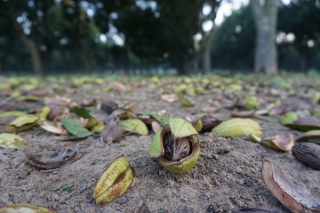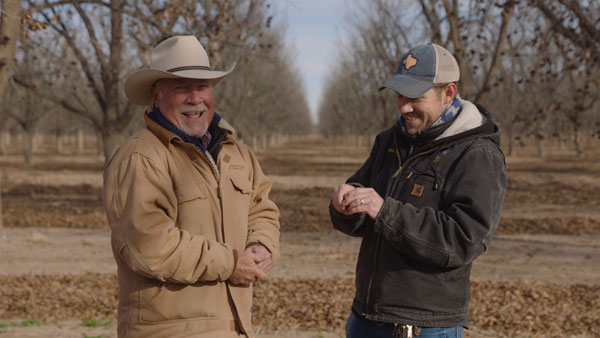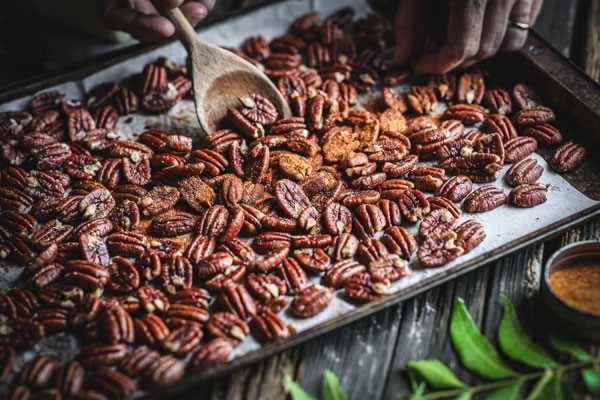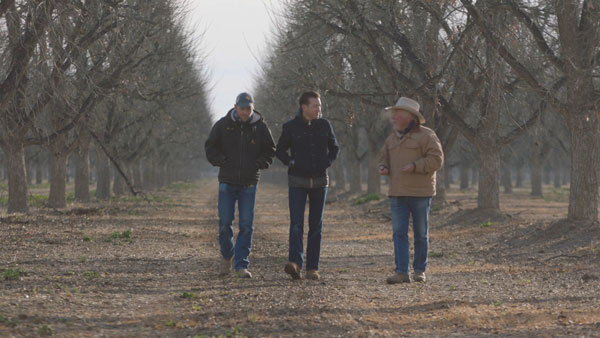
Pecans in a Nutshell
29 January 2021It takes pecan trees seven years from planting to finally produce nuts. Farmers need to plan – sometimes 35 years ahead - and that is just what the Ivey family did in west Texas.
By Thomas Smith
Feedback & comments: This email address is being protected from spambots. You need JavaScript enabled to view it.
Peca n trees can live for hundreds of years and many growers tend the same orchards as their parents and their parents’ parents. However, beginning a pecan orchard is a serious startup investment for farmers as the trees take around seven years to start producing nuts. For the Ivey family of west Texas, it was this pecan-investment that saved their farming way of life.
n trees can live for hundreds of years and many growers tend the same orchards as their parents and their parents’ parents. However, beginning a pecan orchard is a serious startup investment for farmers as the trees take around seven years to start producing nuts. For the Ivey family of west Texas, it was this pecan-investment that saved their farming way of life.
Fourth-generation farmer Shannon Ivey said in 1950 his great grandfather bought land in El Paso County, Texas, to grow cotton. As cotton prices fell, the family began a 35-year process of transitioning their land from cotton to pecans. The process, which began in 1972 and culminated in 2007, was undertaken so the farm could remain financially stable while the new orchards grew into productivity.
“My dad had the foresight to talk my grandfather into transitioning into pecan trees,” Ivey said, “my dad saw the writing on the wall. He realized that with the scale of operation we had, if we didn't do something to change, we were just going to get kicked out of the farm.”
Much like the Ivey family, the pecan tree has a rich history in the state of Texas. Pecans are the only tree nut native to the U.S., and it is easy to see why the pecan is Texas’ official state tree and state pie. Ivey said pecans are integral to Texas food culture and many Texans delight in the non-commercial pecan trees growing in their backyards. Pecans are native to over half of Texas counties and pecan seed and leaf fossils from as early as 6100 B.C. have been found along the Rio Grande river.
Altough the pecan tree is native to eastern Texas, the tree nut thrives in the arid deserts of the El Paso Valley as well. These parts of the Chihuahua Desert receive only inches of rainfall every year, but Ivey said irrigation systems using surface water from the Rio Grande river make the region great for farming. The Ivey farm contains roughly 570 acres of orchards, which is likely to produce over a million pounds of pecans annually.
The grower said pecan trees are alternate bearing, which means farmers will see a high-yield year followed by a less productive one. Trees tend to produce on the same cycle as neighboring orchards due to environmental stressors like the occasional and much-dreaded summer hail. Trees are pruned before each highly productive year to help even out profits. “We're trying to do everything in our power to basically stop what the tree wants to do naturally,” the grower said. “It's so much easier to have even production years versus these high swings.”
 After harvest, the best place for a pecan is in the freezer. A refrigerated pecan will last for weeks, but a frozen pecan can last up to 3 years, although Ivey said they are almost certain to be eaten before then.Pecans are a versatile nut in the kitchen, and their distinctive oil content and nutty flavor make them great for sweet and savory dishes alike. The tree nut works well in salads, pies, toffee, pecan-crusted salmon, and numerous other dishes. Pecans also contain a healthy amount of fiber, protein, monosaturated (healthy) fat, antioxidant vitamins, and phytonutrients like flavonoids, which are typically found in brightly colored produce. Ivey said he also likes to eat them as a snack, sometimes roasted with cinnamon and sugar for a treat.
After harvest, the best place for a pecan is in the freezer. A refrigerated pecan will last for weeks, but a frozen pecan can last up to 3 years, although Ivey said they are almost certain to be eaten before then.Pecans are a versatile nut in the kitchen, and their distinctive oil content and nutty flavor make them great for sweet and savory dishes alike. The tree nut works well in salads, pies, toffee, pecan-crusted salmon, and numerous other dishes. Pecans also contain a healthy amount of fiber, protein, monosaturated (healthy) fat, antioxidant vitamins, and phytonutrients like flavonoids, which are typically found in brightly colored produce. Ivey said he also likes to eat them as a snack, sometimes roasted with cinnamon and sugar for a treat.
“I would describe the pecan as buttery in flavor,” he said. “It should be crisp and have a pleasing texture to your tongue when you’re eating it. Ideally, the color of the pecan should be an appealing golden-brownish color.”
U.S. pecans are never genetically modified but have been bred into a variety of cultivars, each having its own characteristics. The grower said his farm grows Western Schley pecans, a variety that does well in dry climates and has a nuttier flavor than other cultivars.
 Ivey said his farm is naturally sustainable because he only deals with a few pests and it makes economic and environmental sense to farm with the future in mind. “The pecan tree and the Ivey family definitely have a long history together and a long love affair,” he said. “And I realize what a blessing it is to be a fourth-generation farmer, and for us to carry on our legacy so that a fifth generation can take over.”
Ivey said his farm is naturally sustainable because he only deals with a few pests and it makes economic and environmental sense to farm with the future in mind. “The pecan tree and the Ivey family definitely have a long history together and a long love affair,” he said. “And I realize what a blessing it is to be a fourth-generation farmer, and for us to carry on our legacy so that a fifth generation can take over.”
